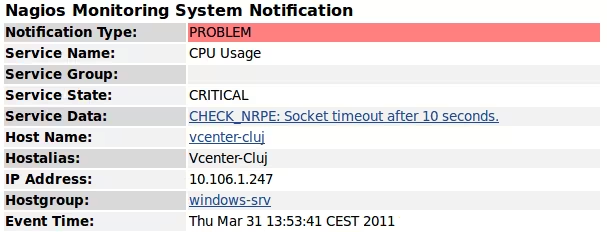Email HTML Monitoring Nagios Notifications Perl Nagios: Improving the Look of Notification Emails Introduction If you've already used standard email notification in Nagios, you'll find it functional but not really attractive. That's why a project called "Flexible Notifications for Nagios " was initiated.
I will explain here how to use it easily. The goal is to have HTML email notifications like this instead of plain text:
You can also do other things like adding images, carbon copies, different languages... but I'll explain here only what I need.
Installation Very simple, create a scripts folder and put the 2 required scripts in it:
-p /etc/nagios3/scripts
cd /etc/nagios3/scripts
"http://nagios.frank4dd.com/howto/source/nagios_send_host_mail.pl"
"http://nagios.frank4dd.com/howto/source/nagios_send_service_mail.pl"
755 nagios_send_host_mail.pl nagios_send_service_mail.pl
Also we'll need to install perl dependencies:
install libmail-sendmail-perl librrds-perl
Configuration commands.cfg Here is the file containing default email commands. You just have to comment the ones shown below and add the new lines (/etc/nagios3/commands.cfg):
###############################################################################
# COMMANDS.CFG - SAMPLE COMMAND DEFINITIONS FOR NAGIOS
################################################################################
################################################################################
# NOTIFICATION COMMANDS
################################################################################
# 'notify-service-by-email' command definition
command{
command_name notify-host-by-email
command_line /bin/sleep 1
}
# 'notify-host-by-email' command definition
#define command{
# command_name notify-host-by-email
# command_line /usr/bin/printf "%b" "***** INTERNAL Nagios *****\n\nNotification Type: $NOTIFICATIONTYPE$\nHost: $HOSTNAME$\nState: $HOSTSTATE$\nAddress: $HOSTADDRESS$\nInfo: $HOSTOUTPUT$\n\nDate/Time: $LONGDATETIME$\n" | /usr/bin/mail -s "** Internal $NOTIFICATIONTYPE$ Host Alert: $HOSTNAME$ is $HOSTSTATE$ **" $CONTACTEMAIL$
# }
# sends HTML e-mails for hosts
command{
command_name host-notify-by-email
command_line /etc/nagios3/scripts/nagios_send_service_mail.pl -c " $CONTACTADDRESS1 $" -f html -u -p "Deimos.fr Monitoring Tool"
}
# 'notify-host-by-email' command definition
#define command{
# command_name host-notify-by-email
# command_line /usr/bin/printf "%b" "***** Nagios *****\n\nNotification Type: $NOTIFICATIONTYPE$\nHost: $HOSTNAME$\nState: $HOSTSTATE$\nAddress: $HOSTADDRESS$\nInfo: $HOSTOUTPUT$\n\nDate/Time: $LONGDATETIME$\n$HOSTACKAUTHOR$: $NOTIFICATIONCOMMENT$\n\n$HOSTNOTES$\n" | /usr/bin/mail -s "** $NOTIFICATIONTYPE$ Host Alert: $HOSTNAME$ is $HOSTSTATE$ **" $CONTACTEMAIL$
# }
# sends HTML e-mails for services
command{
command_name notify-service-by-email
command_line /etc/nagios3/scripts/nagios_send_service_mail.pl -c " $CONTACTADDRESS1 $" -f html -u -p "Deimos.fr Monitoring Tool"
}
# 'notify-service-by-email' command definition
#define command{
# command_name notify-service-by-email
# command_line /usr/bin/printf "%b" "***** INTERNAL Nagios *****\n\nNotification Type: $NOTIFICATIONTYPE$\n\nService: $SERVICEDESC$\nHost: $HOSTALIAS$\nAddress: $HOSTADDRESS$\nState: $SERVICESTATE$\n\nDate/Time: $LONGDATETIME$\n\nAdditional Info:\n\n$SERVICEOUTPUT$" | /usr/bin/mail -s "** $Internal NOTIFICATIONTYPE$ Service Alert: $HOSTALIAS$/$SERVICEDESC$ is $SERVICESTATE$ **" $CONTACTEMAIL$
# }
nagios_send_host_mail.pl and nagios_send_service_mail.pl We now need to modify a few things like URL, names etc. Let's open the files and set custom fields:
...
my $mail_sender = "Nagios Monitoring <xxx@mycompany.com>" ;
my $nagios_cgiurl = "http://nagios/nagios3/cgi-bin" ;
my $o_smtphost = "127.0.0.1" ;
...
Those fields correspond to:
$mail_sender: Email sender name $nagios_cgiurl: The CGI URL to nagios server. It's needed for links in the mail $o_smtphost: The SMTP server That's all. Reload your Nagios now.
April 22, 2011 April 22, 2011 